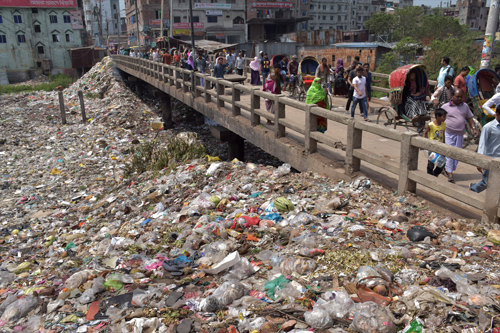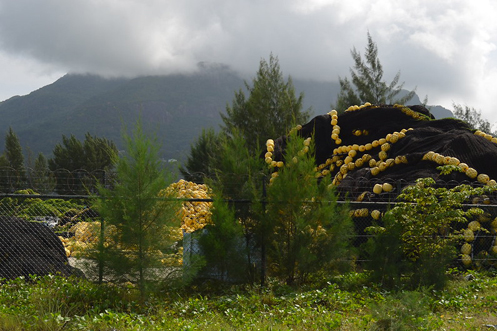
Dhaka, Bangladesh (©Shahriar Hossain)
The project ‘Marine litter and microplastics: promoting the environmentally sound management of plastic waste and achieving the prevention and minimization of the generation of plastic waste’ (BRS-Norad-1), financed by the Norwegian Agency for Development Cooperation (Norad) with additional funding provided by the Government of the Netherlands, seeks to prevent and significantly reduce marine litter and microplastics by strengthening capacity in in Ghana and Sri Lanka as well as at the regional and global levels. Activities in Bangladesh are currently on hold.
This objective is to be achieved through improved infrastructure and waste management systems, improved performance of the private sector, and strengthened global commitments and national and regional instruments. The project has been initiated in December 2018 and is scheduled to be completed in 2023. The activities of the project are structured across three components.
- The final workshop for the BRS-Norad-1 project in Sri Lanka is taking place on 14-15 June 2023 in Colombo, Sri Lanka. For more information, visit the workshop webpage.
-
The training on controlling transboundary movements of plastic waste and preventing and combatting illegal traffic is taking place on 23 June 2023 in Accra, Ghana. For more information, visit the workshop webpage.
Component 1: Controlling the transboundary movements (TBM) of plastic waste
Film - collection of used plastic fishing nets in Ghana
The following activities will serve to enhance legal, policy and institutional capacity and improve decision-making to control the TBM of plastic waste:
● Review and provide support to adjust national legal and institutional frameworks to ensure a sound legal basis to implement and enforce the control regime of the Basel Convention, in particular with respect to the TBM of plastic waste.
● Develop national inventories of the import and export of plastic waste, establish sustainable mechanisms to update inventories and report relevant information in the Basel Convention national reporting format.
● Promote effective control of TBM of plastic waste and build capacity to prevent cases of illegal traffic.
National Joint SBC/WCO/UNODC Training in Sri Lanka to Promote Effective Control of Transboundary Movements of Plastic Waste and Build Capacity to Prevent Cases of Illegal Traffic, 27 September - 1 October 2021, Online
National Joint SBC/WCO/UNODC Training in Sri Lanka to Promote Effective Control of Transboundary Movements of Plastic Waste and Build Capacity to Prevent Cases of Illegal Traffic, 27 September - 1 October 2021, Online)
Component 2: Ensuring the environmentally sound management (ESM) of plastic
In order to increase information on plastic waste flows and enhance capacity to implement ESM of plastic waste, the following activities are being undertaken:
- Develop an inventory toolkit, build capacity to use the toolkit and develop strategies for the ESM of plastic waste.
- Develop a national inventory of plastic waste and a national strategy for the ESM of plastic waste in the target countries.
- Develop recommendations for infrastructure requirements for the downstream management of plastic waste and for a sustainable system for a collection scheme of plastic waste, and pilot the scheme with the informal sector.
- Review and strengthen national legal and institutional frameworks to ensure the ESM of plastic waste.
Component 3: Tackling source

Collected fishing nets - an important source of plastic waste in the oceans
Improved practices, designs and processes towards the prevention and minimization of plastic waste are to be achieved through the following activities:
● Collect best practices and technologies, develop strategies and pilot test them for awareness raising and ESM of plastic waste in the packaging sector.
● Collect best practices and technologies, develop strategies and pilot test them for awareness raising and ESM of plastic waste in the fishing sector.
● Collect best practices and technologies and pilot test them for preventing the releases of micro- and nano-plastics in wastewater.
Moreover, a range of awareness-raising and education materials are being developed and disseminated. Partners, stakeholders and experts have been engaged, inception meetings have been held, baseline studies have been undertaken and substantive activities are underway, for example the creation of national inventories of plastic waste, development of ESM strategies, and planning of pilot projects in the fisheries, packaging and wastewater sectors.
More information on the project can be found in this factsheet .
Click here have a glimpse of the inception workshop in Dhaka, Bangladesh.
Information the meetings and workshops related to the project can be found here.